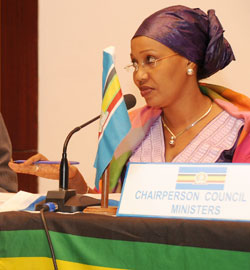KIGALI - Most universities within the East African Community (EAC) still impose discriminative school fees on students from the region, despite a directive from the Council of Ministers calling for uniform structures.The Chairperson of the EAC Council of Ministers, Hafsa Mossi, said this yesterday while addrtessing a session of the East African Legislative Assembly, currently underway in Kigali.


KIGALI - Most universities within the East African Community (EAC) still impose discriminative school fees on students from the region, despite a directive from the Council of Ministers calling for uniform structures.
The Chairperson of the EAC Council of Ministers, Hafsa Mossi, said this yesterday while addrtessing a session of the East African Legislative Assembly, currently underway in Kigali.
Mossi, who is also the Burundian Minister for EAC, said that the majority of regional universities that have complied were private, which she attributed to the fact that these usually charge commercial fees as compared to the public institutions.
"Partner states should subsidize costs of education in public universities through budgetary allocations which will lead to a decrease in tuition charges against non-national students,” Mossi said.
She added that there was a need for each partner state to establish unit costs for all university programmes that would enable the Inter-University Council for East Africa (IUCEA) to come up with harmonised costs.
Mossi pointed out that the inter-university council secretariat had developed a roadmap to guide the institutions respond to the EAC strategic objectives related to the promotion of regional integration and sustainable development.
"The existence of heterogeneous policies on financing higher education, where in all cases, public universities do not get adequate funding from governments, has led university governance systems to establish structures corresponding to the education provided,” said Mossi.
She further noted that Rwanda and Burundi were set to benefit from IUCEA-supported programmes as recent entrants to the bloc.
"At the moment, there are concrete efforts to sensitize in the two new partner states to enhance their participation in IUCEA supported programmes, projects, and other activities,” she noted.The two-week EALA session started Tuesday.
Ends


